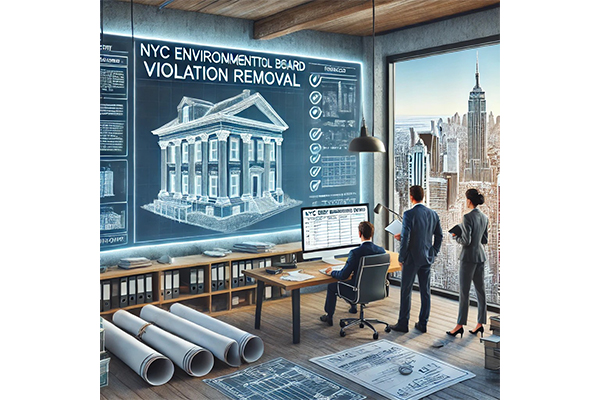
Understanding ECB Violations in New York City: What You Need to Know
If you're a property owner or business operator in New York City, you've likely heard of ECB violations. The Environmental Control Board (ECB) is a critical regulatory body in the city, responsible for adjudicating violations issued by various city agencies like the Department of Buildings (DOB), the Department of Sanitation (DSNY), and the Fire Department (FDNY), among others. These violations can have significant consequences, including fines, legal trouble, and even property liens. Here's everything you need to know about ECB violations in NYC.
What is an ECB Violation?
An ECB violation is an official notice from a NYC enforcement agency that you've failed to comply with local laws or regulations. This could be related to health and safety, building codes, sanitation, noise control, or environmental protection. ECB violations are civil infractions, meaning they aren't criminal offenses, but they can still result in hefty penalties.
Common ECB Violations
Some common reasons for receiving an ECB violation include:
- Illegal construction or building code violations – This includes failure to obtain necessary permits, not following approved construction plans, or safety hazards in a building.
- Failure to maintain property – This could mean allowing unsafe conditions, such as debris buildup, inadequate fire safety measures, or sidewalk defects.
- Environmental issues – You could be fined for things like improper waste disposal, air quality violations, or illegal emissions from a business.
- Sanitation violations – Examples include leaving garbage on the street outside of designated collection times, not recycling properly, or failing to remove snow from sidewalks within the required timeframe.
How to Know If You Have an ECB Violation
The first indication of an ECB violation is usually a notice left at your property or mailed to you. These notices will detail the nature of the violation and the relevant local laws or regulations you’ve allegedly breached.
You can also check for any outstanding ECB violations by visiting the Department of Buildings’ website and using their “Building Information System” (BIS) to look up violations associated with your property. Ignoring these violations is not advisable as they can escalate quickly.
What Happens After an ECB Violation is Issued?
After receiving an ECB violation, you are required to respond, which typically involves appearing at a hearing or paying a fine. Here's the basic process:
- Hearing – You must attend a hearing before the ECB. If you believe the violation was issued in error, this is your opportunity to present evidence and challenge the ticket.
- Paying the Fine – If the violation is upheld, you’ll be required to pay a fine. Fines vary depending on the severity of the violation but can range from a few hundred dollars to tens of thousands.
- Correcting the Issue – Even after paying a fine, you’ll still need to correct the violation. For instance, if it’s a building code violation, you might need to hire a licensed contractor to bring your property up to code. Failure to correct violations can lead to further penalties and fines.
- Liens and Additional Penalties – If a fine goes unpaid, the city may place a lien on your property, which can affect your ability to sell or refinance. In extreme cases, the city could initiate foreclosure proceedings.
How to Resolve an ECB Violation
The best approach to dealing with ECB violations is to be proactive. Here are some steps you can take:
- Attend your hearing: Even if you believe the violation is justified, attending the hearing can sometimes result in a reduced fine or an extended timeline to fix the issue.
- Hire a professional: In many cases, resolving the issue will require the help of licensed professionals, such as contractors, architects, or engineers. For more complex cases, hiring an attorney who specializes in ECB matters could be a wise investment.
- Pay your fines promptly: Avoid additional fees or liens by making timely payments. The longer a fine goes unpaid, the more costly it becomes.
- Correct the violation: Simply paying the fine won’t always be enough. You’ll need to address the underlying issue, whether that’s getting proper permits, fixing a building hazard, or clearing debris from your property.
Tips for Avoiding ECB Violations
Prevention is always better than cure. Here are some steps you can take to avoid ECB violations altogether:
- Stay compliant: Familiarize yourself with NYC regulations that apply to your property or business. This includes ensuring that all permits are up to date, and your property meets all safety and health codes.
- Perform regular inspections: Conducting regular self-inspections or hiring a professional to inspect your property can help identify potential issues before they become violations.
- Maintain your property: Make sure that your property is well-maintained, clean, and free of hazards. This includes promptly removing snow, fixing any structural issues, and ensuring waste is disposed of properly.
- Keep records: Maintain accurate records of all permits, inspections, and any communication with city agencies. This will be invaluable if you need to dispute a violation.
Final Thoughts
ECB violations can be stressful, but understanding the process and taking prompt action can prevent them from becoming a larger financial burden. Whether you’re a property owner or a business operator in NYC, staying on top of local regulations and maintaining your property is key to avoiding these costly violations.
If youre unsure of how to proceed with an ECB violation or need legal assistance, don’t hesitate to consult a professional. Addressing violations quickly and effectively can save you time, money, and headaches in the long run.